This is what a nuclear-powered future might look like
Pressure is rising to find alternative energy sources before a looming electricity crunch hurts both consumers and manufacturers; South Korea may have the answer

It's time to get realistic about the worsening energy situation. A power shortage is approaching and few alternatives to bridge the green transition exist right now. Nuclear is re-emerging as a front-runner, as are doubts and scepticism around its safety as memories of past accidents loom large along with haunting images of mushroom clouds. South Korea, though, shows why nuclear isn't just a pipe dream — or a fuel to fear.
The country's worries — like those of many others — aren't just people feeling cold this winter, or rising prices. It's the lack of electricity that will ultimately hamper everything from the industrial production of goods and food to electric vehicles and the infrastructure to charge them — industries account for over half of the nation's consumption. South Korean firms that supply high-tech goods to the rest of the world, including cars, batteries and chips, seem to have come to that realisation. These energy-intensive sectors won't run on wind, solar and biofuels alone because the actual capacity just isn't enough and for large-scale operations, it isn't consistent. If power starts becoming an issue, so will their profits and global technological heft.
To deal with it, South Korea's biggest companies are putting their weight behind nuclear power plants, which contribute to about 27% of electricity there — an astute move. Samsung C&T Corp, the trading and construction arm of the Samsung empire, is working with NuScale Power Corp to construct the first small modular reactor, or SMR, in the US and in eastern Europe. Meanwhile, Doosan Enerbility Co has also tied up with NuScale to supply equipment. The US firm is the first and only to have had its SMR design receive certification — after a rigorous review process by the US Nuclear Regulatory Commission.
The likes of Daewoo Engineering & Construction Co and Hyundai Engineering & Construction Co are also working to push nuclear forward, while Bill Gates-backed TerraPower is teaming up with South Korean chaebol SK Inc to commercialise its advanced reactor technologies.
All told, the country has around two dozen atomic power plants. There is serious political will behind these efforts now, with recently elected President Yoon Suk Yeol pushing for nuclear to surpass coal usage. A draft long-term energy plan released recently calls for 201.7 terawatt-hours of electricity from nuclear by the end of the decade, or about 33% of the country's total, aided by six new reactors. Coal, natural gas and renewables will each make up just over 20% of the generation.
The economics work, too: Nuclear has a clear cost advantage. As state-owned utility Korea Electric Power Corp noted in its annual filing earlier this year about extending the life of its nuclear units, the failure to do so "would result in a loss of revenues from such units and the increase in our overall fuel costs (as nuclear is the cheapest compared to coal, LNG or oil)." For businesses, it costs 61.5 Korean won per kWh compared with 149.9 Korean won per kWh for solar, helping keep electricity prices low.
Instead of just going green, private and state-backed companies in South Korea are squarely focused on the commercialisation of technologies. Nuclear energy consumption hasn't declined since at least 2017, despite the previous administration's plan to phase it out. Building facilities are relatively economical in the country, with the overnight cost — the price of constructing a plant without any incurred interest — the cheapest in the developed world and even lower than in China and India.
South Korean companies' recent deals are focused on manufacturing and building nuclear technology, not just exploratory efforts to advance a far-off investment. A big advantage is that they draw from the existing supply chain. Parts are brought to the site and assembled there. Large manufacturers are already making the equipment and know how to run technical operations. Meanwhile, the government recently signed agreements with nuclear energy equipment makers to boost the industry by providing financing, research and development funds.
Part of the broader nuclear power problem is that countries facing energy supply issues haven't kept up their facilities, or have abandoned the technology altogether.
Decommissioning these plants has added costs, too. Now, as the pressure rises to find alternative sources to reduce Europe's heavy reliance on Russian gas, there's little that can be done in a short period of time. French state-owned firm Electricite de France SA is exploring keeping two of its UK plants open for longer, as it also struggles to run them efficiently. Germany will make some of its facilities available to get it through the colder months.
The ability to tap existing nuclear resources is set to help dynamics across the world: The head of the International Energy Agency recently said Japan's restart of more nuclear power plants would help ease energy supply issues because global gas availability would rise.
This isn't to say that South Korea has got its nuclear bet totally right — it's had its fair share of hitches in the domestic industry. As with facilities elsewhere in the world, there are questions about how they will manage the waste. Still, it has been working on a near-surface disposal system, which would alleviate concerns about radioactive waste material. NuScale's reactors, for instance, use fuel that is consistent with the type used in the light pressurised water-type reactors employed today. The US has been safely storing it for more than six decades. In addition, newer modules are developing designs that could reduce the overall inventory of spent quantities.
Seoul has shown there are ways to fix the energy crisis — or at least, make it better. Other nations should take note.



 Keep updated, follow The Business Standard's Google news channel
Keep updated, follow The Business Standard's Google news channel
















